| Listing 1 - 10 of 39 | << page >> |
Sort by
|
Book
ISBN: 1283717263 0191548634 9780191548635 9780191776908 0191776904 9781283717267 9780199206780 0199206783 9780191500633 0191500631 Year: 2010 Publisher: Oxford : Oxford University Press,
Abstract | Keywords | Export | Availability | Bookmark
 Loading...
Loading...Choose an application
- Reference Manager
- EndNote
- RefWorks (Direct export to RefWorks)
Aristocracies dominated the social, economic, and institutional history of all European countries until only a few generations ago. William Doyle strips away the myths and beliefs which have always surrounded them, looking at how these very distinctive governing elites held onto power, and analyses when, how, and why they eventually lost it.
Aristocracy (Social class) --- Aristocracy (Political science) --- Aristocracy --- Political science --- Aristocrats --- Upper class --- Nobility --- History.
Book
ISBN: 9780271066165 9780271067513 0271067519 0271066164 Year: 2015 Publisher: University Park, Pennsylvania : The Pennsylvania State University Press,
Abstract | Keywords | Export | Availability | Bookmark
 Loading...
Loading...Choose an application
- Reference Manager
- EndNote
- RefWorks (Direct export to RefWorks)
"Examines the aristocratic experience in early modern France through a close examination of the history of the Rohan, a noble family in the Parisian court who were involved in notable political and religious events from the sixteenth through the eighteenth centuries"--Provided by publisher.
Aristocracy (Social class) --- Aristocracy --- Aristocrats --- Upper class --- Nobility --- History --- France --- Aristocratie --- Rohan family. --- Rohan, Henri, --- Rohan --- Rohan, Henri de
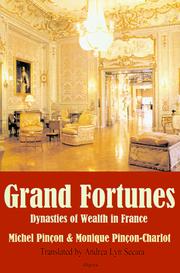
ISBN: 1280346566 9786610346561 189294118X 0964607352 9781892941183 Year: 1998 Publisher: New York : Algora,
Abstract | Keywords | Export | Availability | Bookmark
 Loading...
Loading...Choose an application
- Reference Manager
- EndNote
- RefWorks (Direct export to RefWorks)
Wealth --- Aristocracy (Social class) --- Middle class --- Millionaires --- France --- Social life and customs. --- Aristocracy --- Aristocrats --- Rich people --- Upper class --- Nobility
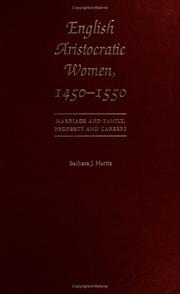
ISBN: 1280523530 1423736346 0198034490 1601297157 9781423736349 9781601297150 9780195056204 0195056205 9780195151282 0195151283 0195056205 0195151283 9786610523535 6610523533 019028157X 0197712797 Year: 2002 Publisher: Oxford : Oxford University Press,
Abstract | Keywords | Export | Availability | Bookmark
 Loading...
Loading...Choose an application
- Reference Manager
- EndNote
- RefWorks (Direct export to RefWorks)
This work, based on archival research, combines a collective portrait of aristocratic women with an analysis of the particular, class-specific form of patriarchy and gender relations that flourished among the upper classes in Yorkist and early Tudor England.
Women --- Upper class women --- Aristocracy (Social class) --- Aristocracy --- Aristocrats --- Upper class --- Nobility --- History --- History. --- England --- 1450-1600 (Renaissance) --- Upper class women - England - History. --- Aristocracy (Social class) - England - History.
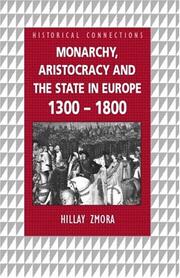
ISBN: 0203190246 1134747993 1280402059 0203184637 9780203190241 9780203184639 9780415150446 0415150442 9780415241076 0415241073 0203184874 9780203184875 0415750442 9781134747948 9781134747986 9781134747993 1134747985 Year: 2001 Publisher: London : Routledge,
Abstract | Keywords | Export | Availability | Bookmark
 Loading...
Loading...Choose an application
- Reference Manager
- EndNote
- RefWorks (Direct export to RefWorks)
This important new book takes a fascinating thematic approach, providing a useful survey of the position and role of the nobility in the government of states in early modern Europe.
Monarchy --- Aristocracy (Social class) --- Aristocracy --- Aristocrats --- Upper class --- Nobility --- Kingdom (Monarchy) --- Executive power --- Political science --- Royalists --- History. --- Europe --- Politics and government. --- Politics --- History --- #A0301H
Book
ISBN: 8024630184 9788024630182 9788024630007 Year: 2016 Publisher: Praze, [Czech Republic] : Karolinum,
Abstract | Keywords | Export | Availability | Bookmark
 Loading...
Loading...Choose an application
- Reference Manager
- EndNote
- RefWorks (Direct export to RefWorks)
Kniha se věnuje poměrně krátkému časovému úseku, kdy Evropou prošla vlna revolucí, ale i dalších změn. Revolucí v té či oné podobě se obávaly všechny evropské země, a to dokonce včetně Velké Británie nebo Francie. Autor svou pozornost zaměřil nikoliv na soupis a detailní popis všech událostí, které přinesly roky 1830–1831, ale na analýzu podmínek, ze kterých ruští představitelé museli vycházet a také na následná opatření, která přijímali tváří v tvář evropskému revolučnímu hnutí. Faktické události zůstávají na pozadí a vpřed vystupují jednotlivci a jejich vnímání situace. Politika Mikulášova Ruska držela výrazně pragmatickou linii, byť často navzdory carovu postoji. Ukazuje se, jak dlouhodobé systémové záležitosti ovlivňují rozhodování v konkrétní krizové situaci a jak důležitá je osobnost v dějinném procesu, a to dokonce i v tak centralizovaném státě, jakým bylo carské Rusko.
Aristocracy (Social class) --- Aristocracy --- Aristocrats --- Upper class --- Nobility --- History. --- Nicholas --- Nikolaus --- Nikolaas --- Nikolaĭ Pavlovich, --- Николай Павлович, --- Mykola --- ניקלי, --- Influence. --- Russia --- Soviet Union --- Politics and government
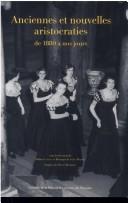
ISBN: 2735118509 273511371X 2735109380 Year: 2007 Publisher: Éditions de la Maison des sciences de l’homme
Abstract | Keywords | Export | Availability | Bookmark
 Loading...
Loading...Choose an application
- Reference Manager
- EndNote
- RefWorks (Direct export to RefWorks)
Sans rien ignorer des spécificités de différentes aristocraties, anciennes et nouvelles, et des groupes qui les constituent, les auteurs de cet ouvrage tentent plutôt de les confronter, de rechercher les caractères communs qui les soudent, les différences qui les séparent et, plus encore, les fondements de clivages souvent ambigus entre aristocrates et non-aristocrates. Leur ambition est tout à la fois de présenter des études de cas précises réalisées en France, Grande-Bretagne, Allemagne, Italie, Hongrie, Finlande et Suède, un état des lieux ainsi que des recherches sur les noblesses menées par historiens, anthropologues et sociologues et enfin de proposer une analyse critique et comparative des évolutions de ces noblesses. Quel est le poids du symbolique mais aussi des décrochements politiques dans les transformations: disparition, désagrégation et parfois recomposition des anciennes aristocraties et constitution de nouvelles aristocraties ? Comment appréhender le phénomène aristocratique dans son extension européenne ? Comment articuler étude des tensions entre appartenances contradictoires - nationale et européenne, nobiliaire et démocratique - dans lesquelles sont parfois enserrés les aristocrates, et analyse des modes de reproduction de ces groupes ? Ce sont quelques-unes des questions majeures abordées dans ce livre.
Nobility --- Aristocracy (Social class) --- Elite (Social sciences) --- Social classes --- Social history --- History. --- Descriptive sociology --- Social conditions --- Elites (Social sciences) --- Aristocracy --- Aristocrats --- History --- Sociology --- Leadership --- Power (Social sciences) --- Social groups --- Upper class --- aristocratie --- XXème siècle --- Europe --- noblesse --- XIXème siècle
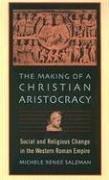
ISBN: 0674043049 9780674043046 0674016033 9780674016033 9780674006416 0674006410 Year: 2009 Publisher: Cambridge, MA
Abstract | Keywords | Export | Availability | Bookmark
 Loading...
Loading...Choose an application
- Reference Manager
- EndNote
- RefWorks (Direct export to RefWorks)
What did it take to cause the Roman aristocracy to turn to Christianity, changing centuries-old beliefs and religious traditions? This title takes a fresh look at this much-debated question, looking at the historical evidence in order to try and understand why pagan aristocrats decided to convert to Christianity.
Christian converts --- Aristocracy (Social class) --- Christian sociology --- Aristocracy --- Aristocrats --- Upper class --- Nobility --- Christians --- Converts --- Religious life --- History --- Christian converts - Rome --- Aristocracy (Social class) - Religious life - Rome --- Sociology, Christian - History - Early church, ca. 30-600 --- Sociology, Christian
Book
ISBN: 1282749919 9786612749919 0748642676 9780748642670 9780748640324 0748640320 Year: 2010 Publisher: Edinburgh : Edinburgh University Press,
Abstract | Keywords | Export | Availability | Bookmark
 Loading...
Loading...Choose an application
- Reference Manager
- EndNote
- RefWorks (Direct export to RefWorks)
From the mid-nineteenth century until the end of World War I, the Sutherland Estate was the largest landed estate in western Europe; at 1.1 million acres, the ducal family owned almost the entire county of Sutherland as well as a further 30,000 acres in England. The estate was owned by the dukes of Sutherland, who were among the richest patrician landowners of the period; from the early nineteenth century, however, the family were shadowed by their reputation as great clearance landlords, something that would come back to haunt them throughout the coming decades.This book:studies the workings
Administration of estates --- Land use, Rural --- Aristocracy (Social class) --- Aristocracy --- Aristocrats --- Upper class --- Nobility --- Rural land use --- Land use --- Agriculture --- Administration --- Estates, Administration of --- Real property --- History --- Sutherland family. --- Sutherland (Scotland) --- Sutherland, Scot. --- Sutherland (Highland Region, Scotland) --- Rural conditions.
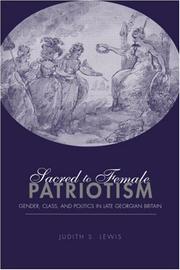
ISBN: 0429236875 0203822021 1299287670 1136761616 9780203822029 9781136761614 9781136761560 9781136761607 9780415944113 9780415944120 1136761608 Year: 2003 Publisher: New York : Routledge,
Abstract | Keywords | Export | Availability | Bookmark
 Loading...
Loading...Choose an application
- Reference Manager
- EndNote
- RefWorks (Direct export to RefWorks)
Missing from much of the scholarship on 18th century British politics is recognition of the extensive participation of aristocratic women. Fortunately, as a literate and self-conscious group, these women created and preserved vast manuscript collections now available to historians. In Sacred to Female Patriotism, Judith S. Lewis taps into these sources to demonstrate how the social and political worlds of Georgian Britain interacted to give women an influential voice in politics that was previously unimagined. The result is a lively, powerful, and important story that challenges many
Women --- Upper class women --- Aristocracy (Social class) --- Aristocracy --- Aristocrats --- Upper class --- Nobility --- Human females --- Wimmin --- Woman --- Womon --- Womyn --- Females --- Human beings --- Femininity --- Political activity --- History. --- Great Britain --- Politics and government
| Listing 1 - 10 of 39 | << page >> |
Sort by
|

 Search
Search Feedback
Feedback About UniCat
About UniCat  Help
Help News
News